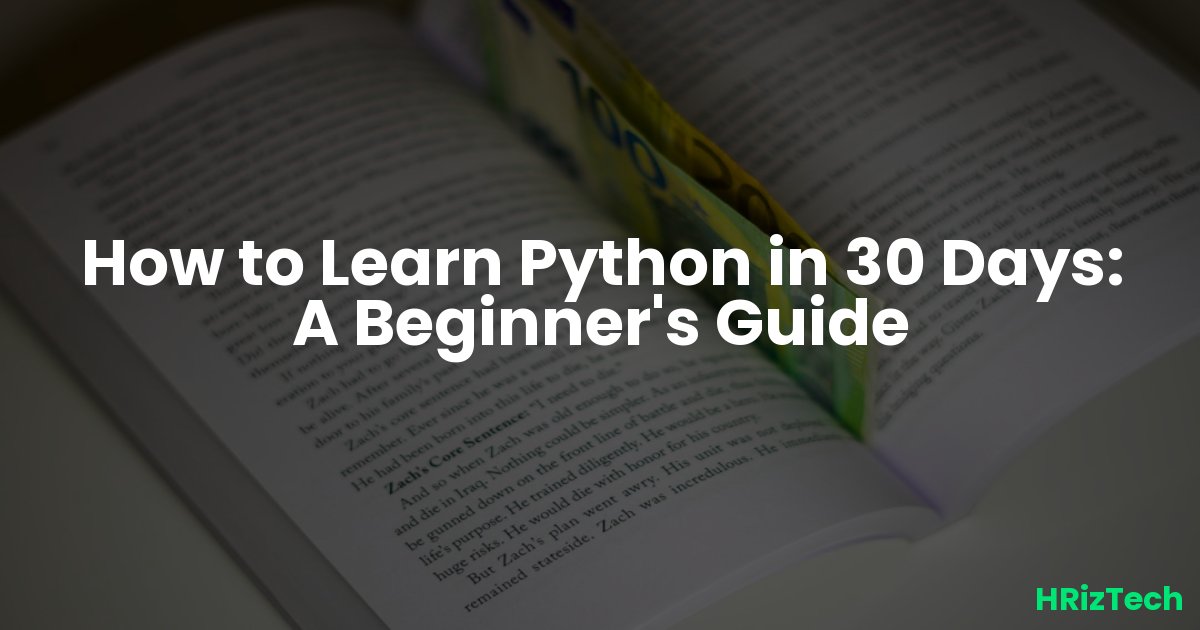How to Learn Python in 30 Days: A Beginner's Guide

How to Learn Python in 30 Days: A Beginner's Guide
Ever wished you could unlock the power of Python programming in a short time? It’s more achievable than you think! This guide shows you how to learn Python in 30 days, even if you're starting from scratch. Learning Python opens doors to exciting fields like AI and data science – fields predicted to boom even further by 2025, according to a recent Gartner report.
What's the Best Way to Learn Python for Beginners?
The key to mastering Python quickly is focused, consistent learning. Forget trying to absorb everything at once; break it down into manageable chunks. We’ll cover the essentials in 30 days, so you can start building cool projects!
Step 1: Setting Up Your Environment
First, you need Python installed on your computer. Download the latest version from the official Python website – it's free and easy! Then, choose a good code editor like VS Code or PyCharm; these provide helpful features for writing and debugging your code.
Step 2: Mastering the Fundamentals
Start with the basics: variables, data types (integers, strings, booleans), operators, and control flow (if/else statements, loops). There are tons of free online resources, like Codecademy and freeCodeCamp, that offer interactive Python tutorials. Focus on understanding the concepts, not just memorizing syntax.
How Do I Start Building an AI Chatbot (Even in 30 Days)?
While building a complex AI chatbot might take longer than 30 days, you can certainly build the foundation. This involves learning about natural language processing (NLP) libraries in Python, such as NLTK or SpaCy. Start with simple chatbots and gradually add more features as you progress. Remember, even small steps forward contribute to your overall progress.
Step 3: Working with Data Structures
Python excels at data manipulation. Learn about lists, tuples, dictionaries, and sets. Understanding these data structures will be vital for working with data in your future projects. Practice using them – the more you use them, the more familiar they become.
Step 4: Object-Oriented Programming (OOP)
Object-oriented programming is a powerful paradigm. Get a grasp of classes, objects, inheritance, and polymorphism. Many real-world Python projects utilize OOP, so it's a valuable skill to develop. Don't get bogged down in overly complex examples; focus on understanding the core concepts.
Beyond the Basics: Exploring Advanced Concepts
Once you’ve grasped the fundamentals, explore more advanced topics. This could include working with files, exception handling, and modules. Libraries like NumPy and Pandas are essential for data science and are well worth exploring. A solid understanding of these will prepare you for many real-world applications.
Step 5: Practice, Practice, Practice!
The most crucial step is consistent practice. Work on small projects to apply what you've learned. Start with simple tasks, like a calculator or a basic to-do list app. Gradually increase the complexity of your projects as your skills improve. Don't be afraid to experiment and make mistakes—that's how you learn!
Step 6: Engage with the Community
Join online forums, participate in coding challenges, and connect with other Python programmers. This is a great way to learn from others, get help when you're stuck, and stay motivated. Stack Overflow is an excellent resource for finding solutions to common programming problems.
How to Stay Motivated When Learning Python?
Learning any new skill takes dedication. Set realistic goals, celebrate small victories, and don't get discouraged by setbacks. Find a learning style that works for you – whether it’s through online courses, books, or hands-on projects. Remember, consistent effort will lead to success. A 2025 cybersecurity report suggests Python skills are increasingly crucial for network security professionals, making your efforts highly relevant to future job prospects.
How to learn Python in 30 days effectively involves a combination of structured learning and dedicated practice. Remember to focus on the fundamentals first, then gradually work towards more advanced concepts. Building small projects along the way will solidify your understanding and boost your confidence.
So, are you ready to start your Python journey? What are your initial goals for learning Python?
This 30-day plan will get you well on your way to Python mastery. Consistent work and a focus on practical application will be key to your success. Remember to celebrate your achievements along the way – you've got this!
Comments
No comments yet. Be the first to comment!